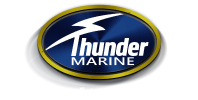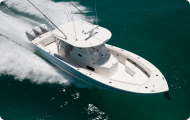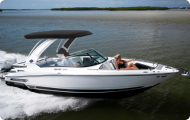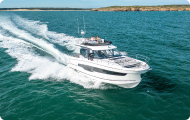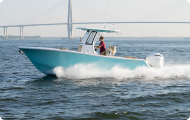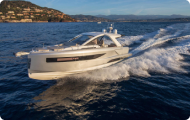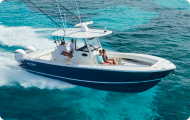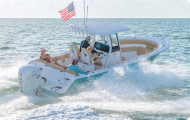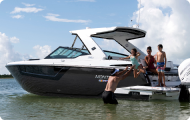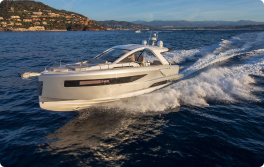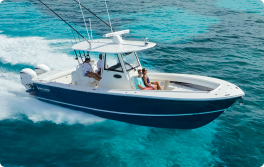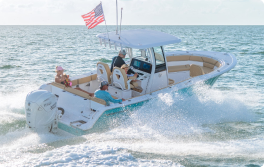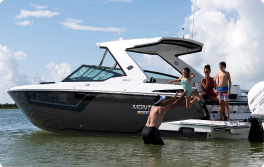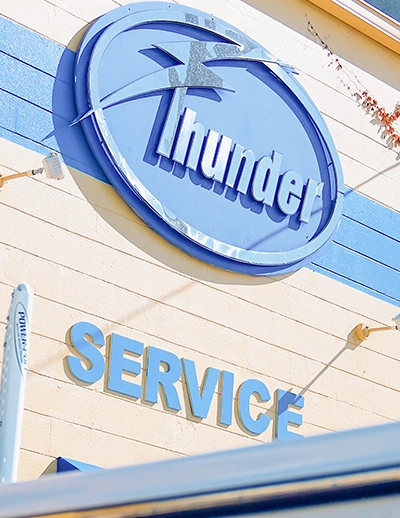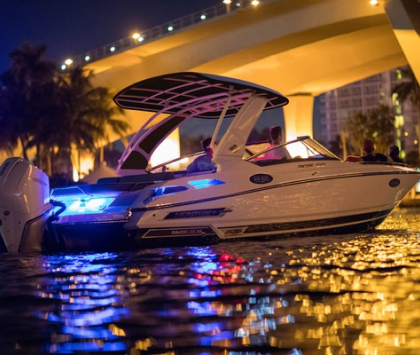Technically a boat’s trailer is not part of your boat, but it often plays a big role in the boating and towing experience. Most new boat owners start with a craft that is stored and frequently towed on a trailer, and trailer trouble can derail your day on the water.
Fortunately, with a little basic maintenance boat owners can avoid the most-common issues related to trailers.
How to Maintain a Boat Trailer:
1. Check your tire pressure.
2. Don’t forget to bring along a spare tire.
3. Periodically check your tires for wear and age.
4. Use wheel bearing protectors.
5. Keep your trailer brakes clean.
6. Have your brake pads or shoes inspected every few seasons.
7. Check the brake fluid reservoir in the master cylinder.
8. Apply lubrication to your trailer’s coupler.
9. Check all of your trailer lights every time you hook up the trailer.
10. Keep the trailer light connection on your tow vehicle covered when not towing to prevent corrosion.
Trailer Tires and Wheels
Problems related to tires and wheel bearings can leave you stranded at the side of the road, and can even be a safety hazard.
Check Tire Pressure
A failed tire caused by low air pressure is probably the number-one cause of trailer trouble, so its good practice to check trailer tire air pressure before hitting the highway.
Inflate to the maximum rating on the tire or as listed on the capacity sticker on the trailer, which may be 60 psi or more.
Heat builds up in a tire with low pressure and can cause the tire to delaminate and fail, which can be a dangerous situation at 70 MPH.
Tires will naturally lose a pound or two of air pressure each month, so it’s especially important to remember to check the tires after the trailer has been sitting unused over the winter.
Don’t Forget the Spare
Not all boat trailers come with a spare tire. If yours did not, get one and a mount for it. It’s good insurance. Remember to maintain the air pressure in the spare, and make sure you travel with tools and a jack you can use to change a flat.
Tire Wear
Periodically check your trailer tires for wear and for age. Most boaters will not wear out the tread on trailer tires, but if you notice a tire is wearing unevenly it could be an indication of a bent axle, or an axle that’s out of alignment. This should be fixed before the tire fails. Tires that are more than six years old should be replaced, according to the National Transportation Safety Board. The last four digits of the DOT code on the tire sidewall indicate the month and year the tire was made; “3517” would indicate the tire was made in the 35th week of 2017. The tires under your trailer should all be ST (Special Trailer) type tires, which are designed specifically for trailer use, with stronger cords and stiffer sidewalls than LT (Light Truck) tires.
Wheel Bearings
Failed wheel bearings are another common cause of trailer trouble. The bearings may get rusty if they are contaminated by water, which is why most boat trailers are equipped with wheel bearing protectors (Bearing Buddy is a popular brand and has become a common term for all bearing protectors).
Wheel bearing protectors use a spring-loaded piston to hold grease in the wheel hub under light pressure, which prevents water from entering the hub and bearing assembly.
The protector will have a grease fitting in its center that’s used to add grease and maintain this pressure.
Read the directions that come with your trailer for details on adding grease.
Even with bearing protectors, it’s a good idea to inspect and repack the wheel bearings with fresh grease every three to five seasons.
Trailer Brakes
All but the lightest boat/trailer combinations will be equipped with brakes—in some states all trailers must have brakes—which will require some maintenance over time to insure safe performance.
Keep Brakes Clean
If you launch your boat in salt water it’s important to rinse the trailer brakes as soon as possible after you retrieve the boat, before corrosion can start to form on brake components.
Some marinas will have a fresh-water hose available for this purpose, and some trailers may be equipped with a hose connection and system to rinse the brakes. Also, rinse off the wheels to keep the lug nuts from rusting tight to the wheel studs.
Brake Pads or Shoes
Trailer brakes may be disc-type (with brake pads) or drum-type (with shoes), both of which wear with use, just like the brake pads on your tow vehicle.
Have the pads or shoes inspected every few seasons.
You can combine brake service with wheel bearing service. A general auto repair service can handle this job.
Ask them to also check the brake lines for signs of rust.
Brake Fluid
Check the brake fluid reservoir in the master cylinder (on the brake tongue) a couple of times a season, following instructions in the trailer owner’s manual.
Fluid level will go down as the pads wear. If the level is suddenly very low you could have a leak in the brake system, which should be repaired immediately.
Trailer Coupler
The surge brake actuator on a boat trailer is part of the coupler assembly (the part that fits over your trailer hitch ball) and it may require occasional lubrication to work smoothly. See your owner’s manual for details.
Trailer Lights
You should check all of your trailer lights every time you hook up the trailer.
Clean Connection
Keep the trailer light connection on your tow vehicle covered when not towing to prevent corrosion from fouling the little metal pins, especially if you live where there’s salt on the roads in winter. Most will have a plastic cap that fits over the connector. You can get a replacement at an auto parts store. A little dielectric grease will also help prevent corrosion.
Get Grounded
A bad ground is the most-common cause or trailer light failure. That’s the white wire, and it may be secured to the trailer frame with a small screw or bolt. The ground needs a good, clean contact with the frame to work. Remove the screw or bolt and clean any rust off of the contact point with a little sandpaper so the ground is contacting bare metal.
Bulbs
Most new trailers have LED lights that should never age, but the incandescent bulbs in older trailer lights will burn out and need to be replaced. The light sockets are also prone to corrosion. Again, use a dab of dielectric grease when replacing the bulbs to prevent corrosion.
